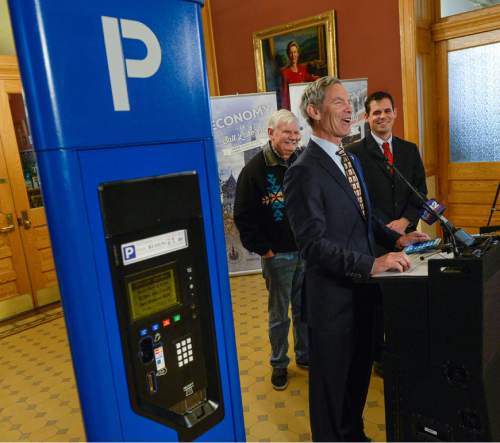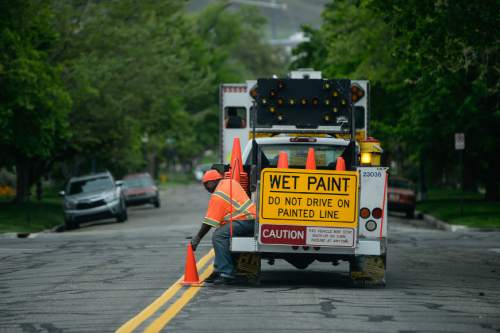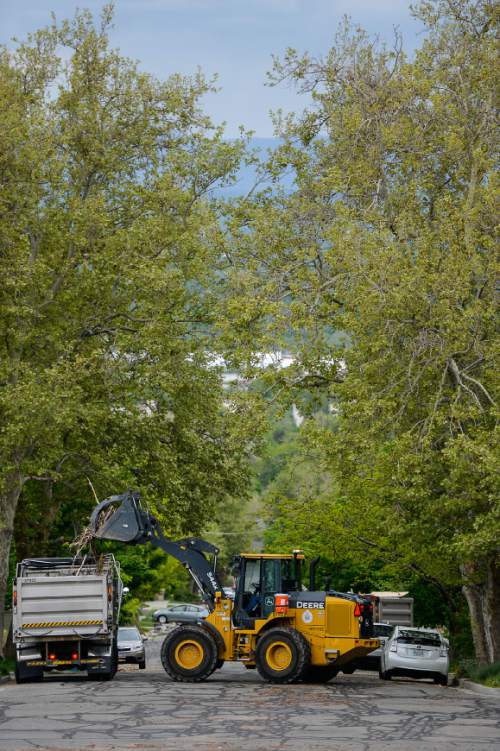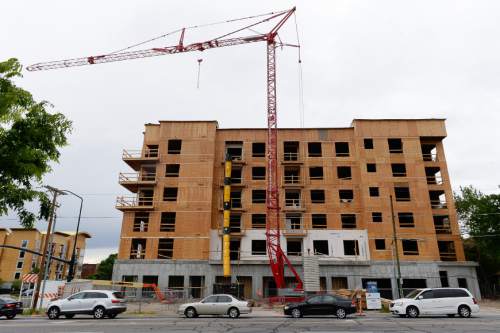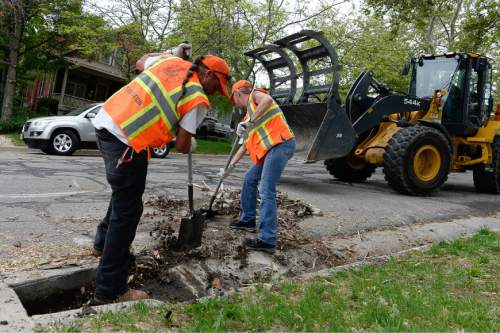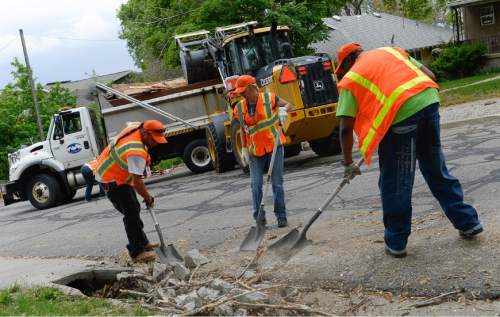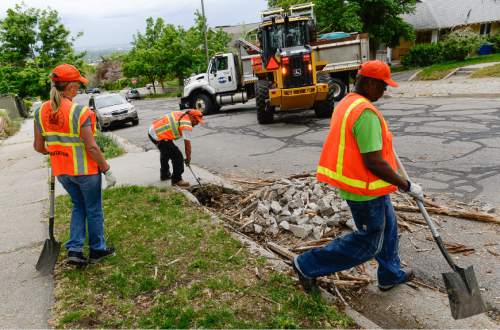This is an archived article that was published on sltrib.com in 2015, and information in the article may be outdated. It is provided only for personal research purposes and may not be reprinted.
A "living wage" and "affordable housing" are hallmarks of Mayor Ralph Becker's proposed $254 million budget for the upcoming fiscal year, which he says will be characterized by an upswing in construction and overall economic activity.
The Salt Lake City mayor painted a rosy picture in his annual budget address in an election year where he is seeking a third term. He proposed no new taxes and touted his record of never having called for a property tax increase.
"The reason I've consistently recommended keeping property taxes flat," he said, "is because I don't think it is right to place an unfair burden on our residents and small-business owners who are least able to afford it."
Two years ago, however, the City Council raised taxes on its own initiative and voted to override the mayor's veto of the 13 percent increase, saying it was necessary to maintain stressed city streets, parks and other infrastructure.
The mayor said an uptick in revenues from sales tax and property tax — about $5.4 million — from the city's thriving economy will keep the municipality on schedule for street and park maintenance in the coming year.
And he cited the Gallup polling organization as saying Salt Lake City was first in the nation in job creation. He also noted that Google has selected the Utah capital as one of just eight metro areas selected for its high-speed fiber network.
"We have really been on a roll, lately," he said. "There is no doubt we have tremendous momentum here in Salt Lake City."
One of the most progressive aspects of the mayor's budget proposal is that all city employees, including seasonal workers, would receive at least $10.10 an hour — a "living wage" — if the proposal were adopted by the City Council.
"This is the right thing to do and it is something I wish every employer in our city would do," Becker said. "While I wish we could mandate a living wage for all residents, the Legislature prohibits it, unfortunately."
All of the city's 3,000 employees would receive a 2 percent cost-of-living increase.
The council is expected to adopt a budget by mid-June. The fiscal year begins July 1.
Becker said his administration will increase its efforts to bring more affordable housing to Salt Lake City by accelerating his "5000 Doors" initiative that depends on incentives for developers of apartment complexes. The mayor has not suggested requiring developers of apartment complexes to provide a percentage of affordable units
Clean air and transportation — including mass transit and bicycles — continue to be at the forefront of Becker's administration.
The mayor is proposing $1 million to fund the Hive Pass transportation program that makes discounted UTA passes available to Salt Lake City residents. The budget also proposes $750,000 to replace aging vehicles with energy-efficient ones.
Becker also would add an employee dedicated to improving city-owned buildings' energy efficiency. "This is the next step in implementation of our City Energy Project," he said. "I fully expect this position will also help us meet our carbon-reduction goals."
Not least in his clean-air effort, the mayor's proposal sets aside $750,000 to "enhance" Salt Lake City's urban forest. That includes replacing aging trees and adding to the overall number of trees in the city.
Glendale's YouthCity program would receive $100,000 to make it permanent at the Sorenson Unity Center, according to the mayor's budget.
The budget also proposes setting aside $500,000 in earthquake preparedness education aimed at homeowners. A magnitude 7 earthquake would collapse many buildings, including houses, and kill as many as 3,000 residents, he said. "It will be a matter of life and death when an earthquake comes our way," he said.
But overall, Becker said, Salt Lake City has a bright future.
"The city budget shows how we plan to continue the work of delivering services to our residents and becoming a 'Great American City,' one that is sustainable, equitable and well run."
The 2014-15 budget is $230 million, but the mayor's proposal of $254 million for fiscal year 2015-16 is, in reality, a $14 million increase. The additional $10 million goes to the Salt Lake City Redevelopment Agency. That funding was not included in the 2014-15 budget.
In an interview after the address, Councilman Luke Garrott — who's one of Becker's challengers for the mayor's seat — warned that that $5.4 million in additional tax revenue in Becker's proposal might not be all new growth. If it is one-time money and is built into the budget, it could mean a de facto tax increase for property owners a year from now.
"It creates a liability," he said. "We don't know if it's new growth or people paying [back] taxes."
Garrott also said the budget was bloated with 25 new employees and new vehicles. A budget amendment coming next week would add $1 million for new fleet expenditures, he said.
"Why are we spending $1.75 million on new vehicles?" he asked.
Councilwoman Erin Mendenhall said she would have liked to see more public safety expenditure in the budget. As the city has worked to make the Pioneer Park area more safe, other neighborhoods have gone without as much policing as they need, she said.
Mendenhall liked the mayor's focus on new affordable housing. She said the council will focus on "inclusionary zoning" that requires developers to set aside a portion of a new project for affordable housing.
And the councilwoman applauded the mayor's $750,000 proposal to improve the urban forest, saying that street canopies are essential for neighborhoods.
The council has scheduled budget sessions for the next five weeks.
The city will take public comments on the budget May 19 and June 2 at 7 p.m. at Salt Lake City Hall, 451 S. State.


